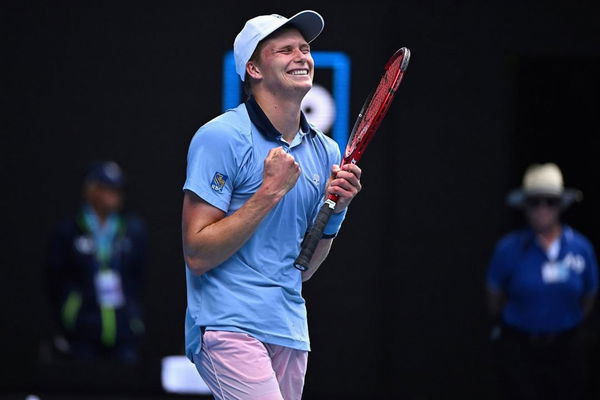

April is Autism Awareness Month, and maybe it’s only fitting that Jenson Brooksby claimed his first ATP title during this time. The 24-year-old American had made a deeply personal revelation last year—he was “diagnosed on the severe end of the spectrum as a very young child” and remained non-verbal until the age of four. Tennis became his safe space, offering strength and structure when words didn’t. Twenty years later, he’s made a powerful statement on the court, winning the US Men’s Clay Court Championship with a commanding 6-4, 6-2 victory over World No. 17 Frances Tiafoe. The journey hasn’t been easy, but Brooksby hopes his story and success can inspire others.
Brooksby started the tournament as a qualifying wild card. That means he wasn’t even supposed to be in the main draw. But not only did he make it, he also saved match points in three separate matches on the road to the trophy. Let’s break that down. One match point in the qualifying first round. Three more in a crazy battle against Alejandro Tabilo, the third seed, in the second round. And one more against top seed Tommy Paul in the semi-final. Clutch doesn’t even begin to describe it. That’s how he achieved his first ATP title, becoming the third-lowest ranking player to win one (since 1990).
After his victory, the American wanted other people like him to gain inspiration and strength from his success. Speaking to Myles Daves, Brooksby said, “One of my biggest reasons for sharing that was because, when I was a kid, I never really had someone—at least in the tennis world—to look up to.”
ADVERTISEMENT
Article continues below this ad
“I think younger kids, or anyone really, whatever they’re doing in life—but especially other tennis players—if they have it, if they’re on the spectrum, and they can see me dealing with some challenges, that can give them a lot of confidence. It shows them that they can do it too, and not use it as a reason to opt out or believe they can’t achieve those things. I even saw one of the ball girls…had it; that was pretty cool for me. She had a big smile. That’s my goal.”
Jenson Brooksby, champion on the ATP tour for the first time, spoke with me after his big win in Houston. Seems fitting this big moment in his career takes place in April, the month of Autism Awareness, after recently revealing he was on the spectrum himself as a child.#USClay pic.twitter.com/9zknb5xgNK
— Myles David (@TunedIntoTennis) April 7, 2025
Autism spectrum disorder affects communication, social interaction, and behavior. Transitioning into the world of tennis wasn’t easy. Brooksby had to work hard. Talking to BBC Sport, he shared, “I spent about 40 hours a week with therapists to be able to even just start talking … (and) then to get better at communication and social situations.”
Michelle Wagner, his therapist, remembers his journey. Diagnosed as a “very severe case,” she now sees him on “the very mild end of the spectrum.” She called his progress “an unusual and unique outcome.”
Even before he found tennis, Brooksby was all about sports. Basketball, swimming, and track and field were part of his childhood. “Sport was a big release for me. If I sit for a long time, I can have a lot of energy bottled up, and so being a very active kid really let it out,” he explained. That energy soon found its place on a tennis court. “I always wanted to train to try to be good at something,” he added. “Even at that age, I think I had that mindset of competing and to be good at something.”
What’s your perspective on:
From autism to ATP champion—Is Brooksby the comeback story tennis needed?
Have an interesting take?
However, that’s not the only thing he has overcome. In 2023, he was the one to watch, ranking 33, but then it all changed.
ADVERTISEMENT
Article continues below this ad
How Jenson Brooksby was missing from action because of surgeries and a doping ban
For a while, he looked like the next big American star. Flashback to 2021. Brooksby secured three Challenger titles in Potchefstroom-2, Orlando-1, and Tallahassee. This success propelled him into the top 150, reaching a career-high ranking of world No. 149 on June 14, 2021. That same year, Brooksby made his first ATP final in Newport. Although Brooksby qualified for the 2021 Next Generation ATP Finals, he did not play due to injury. And that’s where things took a turn.
After the 2023 Australian Open, Brooksby had surgery on both wrists. While recovering, he was suspended by the International Tennis Integrity Agency in July 2023 for missing three doping tests. In October, he received an 18-month suspension. However, his team presented evidence that his autism made it harder for him to keep track of responsibilities like scheduling tests. The punishment was reduced to 13 months, backdated to his last missed test.
ADVERTISEMENT
Article continues below this ad
His suspension ended in March 2024. But Brooksby wasn’t ready to jump back in. He needed more time to heal. When he finally returned at the 2025 BNP Paribas Open, it had been over two years since his last tour-level win. He picked up a couple before losing to eventual champion Jack Draper in the third round. Draper left a sweet message on the camera lens that read, “Good to have a great player back.”
Now, the win in Houston feels like the real return. Brooksby’s story is about more than just forehands and backhands. It’s about coming back again and again, no matter what’s thrown at you.
ADVERTISEMENT
ADVERTISEMENT
ADVERTISEMENT
ADVERTISEMENT


From autism to ATP champion—Is Brooksby the comeback story tennis needed?